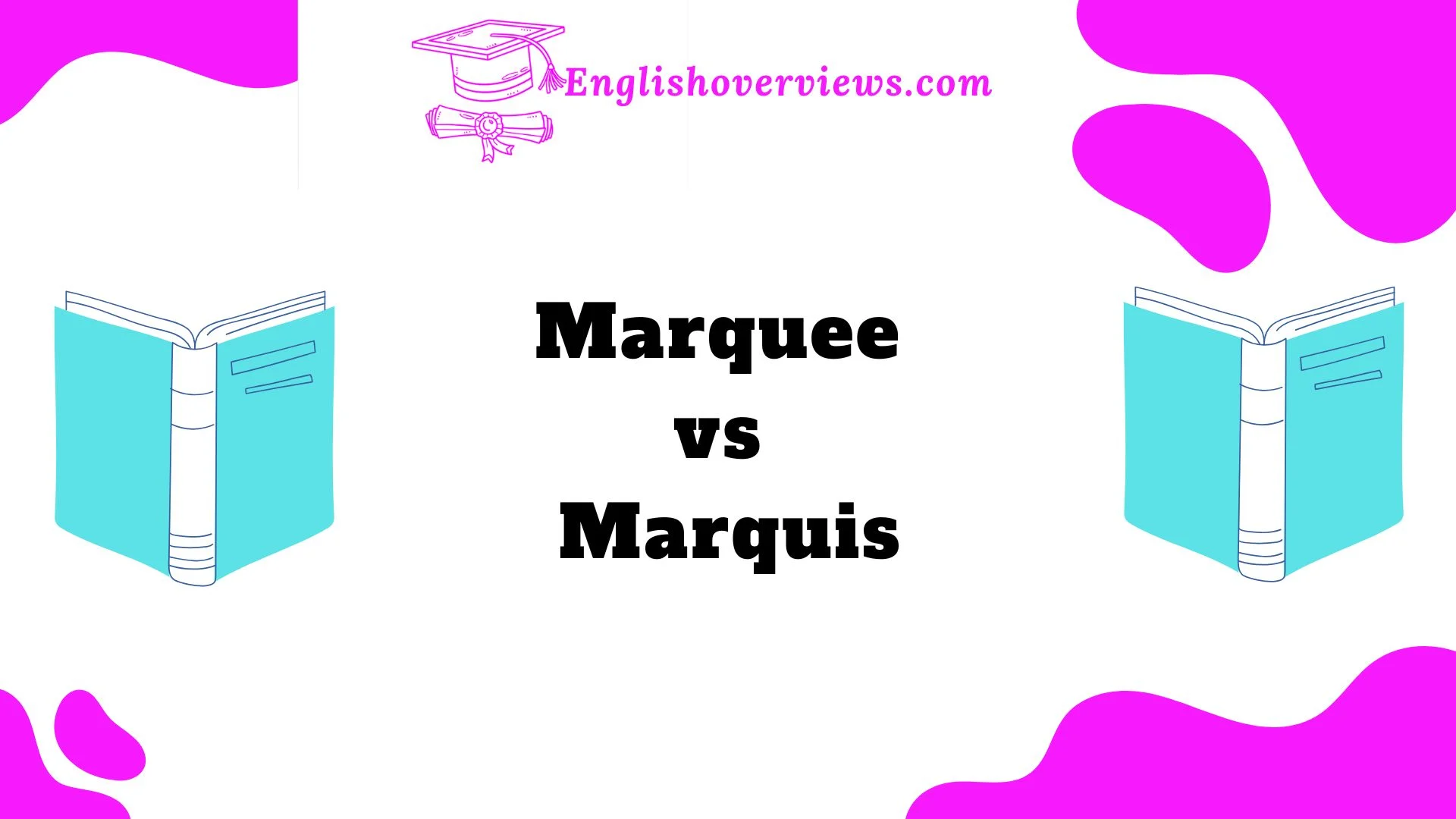In the English language, homophones words that sound the same but have different meanings and spellings are a common source of confusion. Among the most perplexing are “marquee” and “marquis.“ Although they sound similar, these two words differ greatly in meaning, usage, and context.
Have you ever wondered why “marquee” is associated with events, entertainment, and grand displays, while “marquis” evokes imagery of nobility, aristocracy, and history? Knowing these differences is essential, whether you’re writing a formal document, holding a conversation, or simply expanding your vocabulary.
Understanding “Marquee”
Definition of Marquee
The word “marquee” traces its origins to the French term marquise, which referred to a type of canopy or shelter. Over time, the meaning of the word expanded, particularly in English, to include a range of uses.
Today, “marquee” has three primary definitions:
- A large, covered structure or tent used for events or gatherings (commonly in British English).
- A sign board or display above theaters or cinemas announcing performances (commonly in North American English).
- A prominent or star event, person, or feature (used figuratively, especially in sports and entertainment).
Let’s explore these in more detail.
Usage of “Marquee” in North American English
In North America, “marquee” is often linked to the entertainment industry. The term is commonly used to describe the bright, illuminated signs outside theaters, cinemas, and other venues. These marquee signs typically showcase the names of movies, performers, or events.
Additionally, the word has evolved to describe something or someone of prominence a “marquee player” or a “marquee event.” For example:
- “The Lakers signed a marquee player to lead the team this season.”
- “The film festival’s marquee event is the screening of a long-awaited documentary.”
Case Study: Marquee in Sports
In professional sports, the term “marquee player” is frequently used to refer to high-profile athletes whose star power draws audiences. For example, Cristiano Ronaldo is often described as a marquee signing for football clubs due to his ability to attract both fans and sponsors.
Usage of “Marquee” in British English
In British English, “marquee” is more closely associated with large tents used for events like weddings, garden parties, and festivals. These structures are not only practical but also symbolize elegance and sophistication.
Examples from Britain
- “The outdoor wedding was held in a beautifully decorated marquee.”
- “Guests at the summer festival gathered inside the marquee to escape the rain.”
Cultural Significance
In Britain, marquees have long been a staple of outdoor social events. They provide shelter while maintaining a sense of grandeur, making them popular for everything from royal celebrations to countryside fairs.
Examples of “Marquee” in Sentences
Here’s how the term is used in different contexts:
- Entertainment: “The movie title flashed brightly on the marquee outside the theater.”
- Sports: “He’s the marquee player of the season, with the talent to turn the team around.”
- Events: “The company hosted its annual gala in a large marquee on the estate.”
Exploring “Marquis”
Definition of Marquis
The word “marquis” (pronounced mar-kee or mar-kwis) refers to a noble rank in European aristocracy. Its roots lie in the Latin word marchio, which means “march boundary” or “border.” Historically, a marquis was a governor or ruler of a border territory, a position that carried both prestige and responsibility.
In modern contexts, “marquis” is used less frequently but still retains its association with nobility and historical significance.
Historical Context of “Marquis”
During the feudal era, a marquis ranked below a duke but above a count or earl. This hierarchy was particularly prominent in France, where the title held significant importance. Marquises were often tasked with defending border territories or “marches,” hence the name.
Example from History
- “The Marquis de Lafayette played a key role in the American Revolution, bridging French and American efforts for independence.”
Regional Variations: Marquis vs. Marquess
One common source of confusion is the difference between “marquis” and “marquess.” While they refer to the same noble rank, the distinction lies in their regional usage:
- Marquis: The French term, used in France and countries influenced by French culture.
- Marquess: The Anglicized version, used in Britain and its former colonies.
Table: Marquis vs. Marquess
| Aspect | Marquis | Marquess |
| Pronunciation | mar-kee or mar-kwis | mar-kwis |
| Origin | French | British |
| Usage | Predominantly in France and Europe. | Primarily in the UK. |
Examples of “Marquis” in Sentences
- “The marquis ruled over the borderlands with both power and grace.”
- “As a marquess, he was second only to the duke in the royal court’s hierarchy.”
Key Differences Between Marquee and Marquis
To simplify the distinctions, here’s a side-by-side comparison of the two terms:
| Aspect | Marquee | Marquis |
| Definition | A canopy, sign, or headline event/person. | A noble title in European aristocracy. |
| Usage | Events, entertainment, sports. | Historical and aristocratic contexts. |
| Cultural Role | Prominence in modern settings (e.g., theaters, sports). | Prestige in feudal and noble systems. |
| Example | “The marquee advertised the film.” | “The marquis held a banquet at his estate.” |
Practical Tips to Avoid Confusion
Here are some memory aids to help you remember the differences:
- “Marquee” relates to events and entertainment. Think of movie theaters and parties.
- “Marquis” is rooted in history and nobility. Imagine castles, courts, and royal titles.
- Visualize contexts. Picture a marquee sign above a theater versus a marquis hosting a grand event.
- Use spelling clues. The double “e” in “marquee” can remind you of its connection to “events.”
Why It Matters
Understanding the distinction between “marquee” and “marquis” is essential for clear communication. Mixing them up can lead to misunderstandings or make your writing appear less polished.
For instance:
- Saying “The marquis headlined the event” would confuse readers, as “marquis” refers to nobility, not entertainment.
Additionally, proper usage reflects a deeper appreciation for the nuances of the English language, which can enhance your credibility as a writer or speaker.
Real-World Examples and Case Studies
Case Study 1: Marquee Events in Entertainment
The term “marquee event” is often used in the context of high-profile occasions. For example, the Oscars are considered a marquee event in the film industry, drawing global attention each year.
Case Study 2: Marquis in Literature
The Marquis de Sade, a French nobleman, is a famous (albeit controversial) historical figure whose name is synonymous with literature exploring taboo subjects. His title reflects the historical significance of the term “marquis.”
FAQs
1. What is the difference between “marquee” and “marquis”?
“Marquee” refers to a canopy, sign, or headline event, while “marquis” is a noble title associated with European aristocracy.
2. Is “marquis” still used today?
Yes, though primarily in historical or ceremonial contexts. It’s less common in everyday language.
3. What’s the difference between “marquis” and “marquess”?
Both refer to the same noble rank. “Marquis” is French, while “marquess” is the British variant.
4. Can “marquee” refer to people?
Yes, in North American English, “marquee” can describe a prominent person, such as a marquee actor or marquee player.
5. Why do people confuse these terms?
The similarity in pronunciation makes them easy to mix up, but their meanings and usage are entirely different.

Alyan Ashraf is the creative mind behind English Overviews, a platform dedicated to helping learners master the English language. Passionate about education and language development, Alyan specializes in simplifying complex English concepts, making learning accessible for students of all levels.











